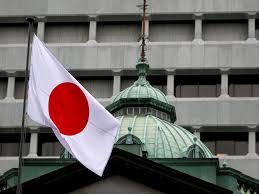
Wholesale prices in Japan surged at their fastest annual pace in 13 years which underlined the rising commodity costs, showed data released on Thursday. This also reflected how global inflationary pressures are impacting companies that are already struggling to cope up with the Covid-19 pandemic hit.
Since companies are perceived to be reluctant to pass on the higher costs on to households, therefore analysts are of the opinion that this inflationary pressure is unlikely to prompt the Bank of Japan to draw scale back its massive stimulus implemented to combat the pandemic woes any time soon.
"We're seeing emerging signs of cost-push inflation. If this is not accompanied by rising wages, we could see Japanese consumers' purchasing power decline," said Mari Iwashita, chief market economist at Daiwa Securities.
According to data released on Thursday by the Bank of Japan, there was a 4.9 per cent year on year rise in the corporate goods price index (CGPI), which is a measure of the prices that companies charge each other for their goods. That was higher than the median market forecast for a 4.5 per cent surge for the CGPI.
The number saw a surge of 3.8 per cent year on year in the month of April which was the largest annual increase since September 2008 when prices of a range of products were pushed up in Japan because of a spike in food and raw material costs globally.
In May, there was also a rise in the factory gate prices in China which was at the fastest annual pace in more than 12 years. That underscored the tough balancing act that policy makers need to do between supporting their economies and in keeping at bay unwelcome inflationary pressures.
For Japan, the surge in the costs of raw materials is particularly impactful even as there is state of emergency curbs imposed to combat the spread of the health crisis which is seen to have a down pressure on consumption and which is also perceived to make it difficult for retailers to charge households higher prices for their goods.
The most important benchmark the BOJ looks at in setting monetary policy –core consumer prices had dropped by 0.1 per cent year on year in April which was the ninth straight month of decline.
"Rising commodities prices reflecting the global economic recovery is pushing up wholesale prices for a broad range of goods," Shigeru Shimizu, head of the BOJ's price statistics division, told a briefing on Japan's wholesale price data. "The data shows companies are starting to pass on rising costs, though the gain in wholesale prices is driven more by external factors rather than domestic demand," he said.
The BOJ data showed that there was a 53.5 per cent jump in oil and coal prices in May while there was a 41.6 per surge in prices of nonferrous metals as the costs of raw material surged because of greater demand from the United States and China.
(Source:www.reuters.com)
Since companies are perceived to be reluctant to pass on the higher costs on to households, therefore analysts are of the opinion that this inflationary pressure is unlikely to prompt the Bank of Japan to draw scale back its massive stimulus implemented to combat the pandemic woes any time soon.
"We're seeing emerging signs of cost-push inflation. If this is not accompanied by rising wages, we could see Japanese consumers' purchasing power decline," said Mari Iwashita, chief market economist at Daiwa Securities.
According to data released on Thursday by the Bank of Japan, there was a 4.9 per cent year on year rise in the corporate goods price index (CGPI), which is a measure of the prices that companies charge each other for their goods. That was higher than the median market forecast for a 4.5 per cent surge for the CGPI.
The number saw a surge of 3.8 per cent year on year in the month of April which was the largest annual increase since September 2008 when prices of a range of products were pushed up in Japan because of a spike in food and raw material costs globally.
In May, there was also a rise in the factory gate prices in China which was at the fastest annual pace in more than 12 years. That underscored the tough balancing act that policy makers need to do between supporting their economies and in keeping at bay unwelcome inflationary pressures.
For Japan, the surge in the costs of raw materials is particularly impactful even as there is state of emergency curbs imposed to combat the spread of the health crisis which is seen to have a down pressure on consumption and which is also perceived to make it difficult for retailers to charge households higher prices for their goods.
The most important benchmark the BOJ looks at in setting monetary policy –core consumer prices had dropped by 0.1 per cent year on year in April which was the ninth straight month of decline.
"Rising commodities prices reflecting the global economic recovery is pushing up wholesale prices for a broad range of goods," Shigeru Shimizu, head of the BOJ's price statistics division, told a briefing on Japan's wholesale price data. "The data shows companies are starting to pass on rising costs, though the gain in wholesale prices is driven more by external factors rather than domestic demand," he said.
The BOJ data showed that there was a 53.5 per cent jump in oil and coal prices in May while there was a 41.6 per surge in prices of nonferrous metals as the costs of raw material surged because of greater demand from the United States and China.
(Source:www.reuters.com)





